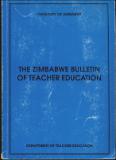| dc.contributor.author | Nhundu, Tichatonga J. | |
| dc.coverage.spatial | Zimbabwe. | en |
| dc.date.accessioned | 2016-03-21T16:32:02Z | |
| dc.date.available | 2016-03-21T16:32:02Z | |
| dc.date.issued | 1999-02 | |
| dc.identifier.citation | Nhundu, T.J. (1999) University distance education in Zimbabwe: an examination of the potential of distance education in human resources development, Zimbabwe Bulletin of Teacher Education, vol. 1, no.1, pp. 46-61. Harare: DTE. | en |
| dc.identifier.issn | 1022-3800 | |
| dc.identifier.uri | https://opendocs.ids.ac.uk/opendocs/handle/20.500.12413/10203 | |
| dc.description | A journal review of education in Zimbabwe since black independence in 1980 and the contribution made by distant education to the Human Resources capacity of the country. | en |
| dc.description.abstract | A review of education since Independence in 1980 reveals unprecedented quantitative expansion at primary and secondary school levels which is now creating severe demographic pressure for university education in Zimbabwe. Further demand for university places comes from working and non-working adults who seek lifelong access to university education and training or were excluded from higher education for various reasons. The situation is worsened by the inability of conventional tertiary institutions to increase access to education and training at lower unit costs, white Government lacks the financial means to expand or establish more conventional universities. In this context, university distance education has become am important pointy option for Zimbabawe because of its potential to widen access and satisfy various kinds o f human resources development needs in a more cost-effective manner. The setting up of the University (of Zimbabwe) College of Distanace Education (UCDE) highlights Government concern for increased access to university education and training. An examination of the potential of IK T)E in the provision of education and training in Zimbabwe, contained in this paper, reveals several competitive advantages over conventional approaches. However, the paper argues that Government has the responsibility to ensure that UCDE gets a prominent plaice in public policy and that this commitment should translate into appropriate resource allocation in terms of setting up modern communications infrastructure, equipping regional study- centres. and district resource centres in order to ensure the viability of university distance education. | en |
| dc.language.iso | en | en |
| dc.publisher | Department of Teacher Education (DTE), University of Zimbabwe (UZ) | en |
| dc.rights.uri | http://creativecommons.org/licenses/by-nc-nd/3.0/ | en |
| dc.subject | Education | en |
| dc.title | University distance education in Zimbabwe: an examination of the potential of distance education in human resources development | en |
| dc.type | Article | en |
| dc.rights.holder | University of Zimbabwe (UZ) | en |


